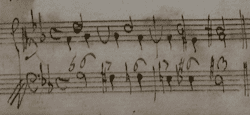A passus duriusculus is a chromatic step or a chromatic passage.
It seems that Christoph Bernhard (1628–1692) —a German pupil of Heinrich Schütz, singer, composer, kapellmeister and author of three handwritten treatises on composition— was the first and only author to use the term passus duriusculus. (So, it doesn’t stem from rhetoric but is meant to describe purely musical phenomena.) In his Tractatus compositionis augmentatus, written probably between 1657 and 1663, he defines the most common type of passus duriusculus as follows:
“Passus duriusculus, einer Stimmen gegen sich selbst, ist, wenn eine Stimme ein Semitonium minus steiget, oder fället.”
“The somewhat hard passage of one voice against itself [i.e. consecutive notes in a melody, not intervals between two voices] is when a voice rises or falls a minor semitone.”

Notice how Bernhard’s examples both span a fourth, the first one descending, the second ascending.
The passus duriusculus is related to two other musical figures mentioned only by Bernhard:
- saltus duriusculus (a somewhat hard leap): an augmented fourth, a diminished fifth or a diminished seventh, for instance

- cadentia duriusculus (a somewhat hard cadence): a (rare) ⑤–① cadence that is preceded with a ⑥–④ snippet, ⑥ set with a fourth (in a minor key, this fourth is augmented), ④ with an unprepared seventh that, moreover, resolves not above ④ but above ⑤.

Select Bibliography
Bartel, Dietrich. Musica Poetica: Musical-Rhetorical Figures in German Baroque Music (Lincoln and London: University of Nebraska, 1997).
Bernhard, Christoph. Die Kompositionslehre Heinrich Schützens in der Fassung seines Schülers Christoph Bernhard — Eingeleitet und herausgegeben von Joseph Müller-Blattau — Vierte Auflage (Kassel: Bärenreiter, 2003).
De Swerts, Gerardus. Musurgia Rhetorica — Studien zur Affektenlehre des Barock (Antwerp and Cologne: author, 1984).
Williams, Peter. The Chromatic Fourth during Four Centuries of Music (Oxford: Clarendon Press, 1997).
